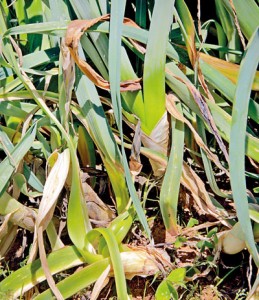News
We may have to give up farming: Nuwara Eliya farmers
View(s):Restrict the cultivation of ‘English vegetables’ only to Nuwara Eliya, say upcountry farmers as they face hardships due to plummeting market prices
Pix and text by Shelton Hettiarachchi

The rot sets in: Leek cultivation
Nuwara Eliya was once known as the ‘Land of English vegetables’ but today farmers in the area face desperate times as prices of vegetables have dropped drastically. Hundreds of kilos of vegetables are being turned into compost, emphasising the urgent need for a proper distributing system for vegetables.
In1828, when then Ceylon was under British rule, Englishmen introduced vegetables for their consumption, commonly known as English vegetables, including carrot, leeks, beet, potato and salad leaves, to Nuwara Eliya.
But over the years with Nuwara Eliya becoming more popular as a holiday destination and little emphasis being given by the state to improve agriculture, farmers have been facing hard times, say some who recall with nostalgia when farming was a flourishing industry.
“As a result of the dry spell throughout the country paddy lands in the low country have been cultivated with upcountry vegetables such as carrot, cabbage as the water supply was not enough to cultivate paddy. This has caused an excess amount of upcountry vegetables in the market and the result is low prices for our products,” say farmers.

Rotting cabbage : Discarded, soon to be turned into compost
“As Nuwara Eliya farmers we don’t have alternative vegetables to grow. We can’t grow brinjals, onions, and tomato; but only those that are conducive to the upcountry weather. I think English vegetable cultivation should be limited only to Nuwara Eliya,” said S. Chandrasekaran (57), a farmer since 1983.
Imesha Madhuranga who has been a farmer for nine years laments that his leek cultivation of about three acres has begun to rot.
He said he had not sold the yield since November last year.
“I had to spend about Rs. 400,000 for my cultivation. But I have been keeping my yield in the land for more than 5 ½ months as the prices in the market are not enough even to meet the expenses.” he said.
“A day before Thaipongal the price of a kilo of cabbage fetched Rs 22 but two days later it dropped to Rs 10. I guess it is the strategy of the businessmen,” another farmer said.

Imesha Madhuranga: Not sold his leek yield since November due to low prices
The farmers in Nuwara Eliya say there is a notable taste and nutritional difference between Nuwara Eliya vegetables and others. Yet farmers have to supply their products to the market through brokers. They vehemently denied various reports that farmers washed the vegetable in water contaminated by sewage.
Many farmers say if this situation continues they may have to give up farming and seek alternative employment.
Nuwara Eliya Economic Centre manager R.M. Bandara said according to his experience the prices will drop further.
“On Wednesday leek, cabbage, carrot, beet, potato were priced as Rs 15, 80, 35, 30-35, 100-105 respectively in the economic center,” he said.
“The cold climate the past four months was supportive for English vegetables. This is one of the the causes for this unexpected surplus,” he said .Meanwhile some farmers complained that their cultivations were destroyed due to low quality seeds they had bought.
“There is no government officer to instruct us about seeds. Only the vendors and the workers in the seed shops do so. They market different brands according to their wish,” farmers charged.
Nuwara Eliya District, Agriculture director A.G.C. Bapu said they don’t agree with the farmers’ argument that English vegetable cultivation should only be limited to Nuwara Eliya.
“The best option is to conserve the soil by cultivating potato in Nuwara Eliya. Farmers should focus more on scientific methods and not merely rely on agro-chemicals,” he said.

